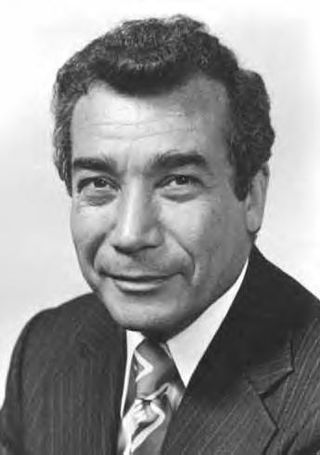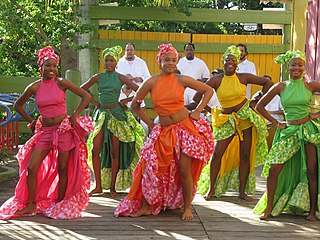Related Research Articles

Puerto Rico, officially the Commonwealth of Puerto Rico, is a Caribbean island, Commonwealth, and unincorporated territory of the United States. It is located in the northeast Caribbean Sea, approximately 1,000 miles (1,600 km) southeast of Miami, Florida, between the Dominican Republic and the U.S. Virgin Islands, and includes the eponymous main island and several smaller islands, such as Mona, Culebra, and Vieques. With roughly 3.2 million residents, it is divided into 78 municipalities, of which the most populous is the capital municipality of San Juan. Spanish and English are the official languages of the executive branch of government, though Spanish predominates.

WAPA-TV is a Spanish-language independent television station in San Juan, Puerto Rico. It is owned by WAPA Media Group. WAPA-TV's studios are located on Avenida Luis Vigoreaux in Guaynabo, and its transmitter is located at the WKAQ-TV transmission tower at Cerro La Santa in Cayey near the Bosque Estatal de Carite mountain reserve.

Nuyorican is a portmanteau word blending "New York" and "Puerto Rican", referring to Puerto Ricans located in or around New York City, their culture, or their descendants. This term is sometimes used for Puerto Ricans living in other areas in the Northeastern US Mainland outside New York State as well. The term is also used by Islander Puerto Ricans to differentiate those of Puerto Rican descent from the Puerto Rico–born.

Rafael Cordero Santiago, better known as "Churumba", was the Mayor of Ponce, Puerto Rico, from 1989 to 2004. Many considered him as a synonym of Ponce, being baptized as "El León Mayor", an allusion to the city's official symbol, the lion. Mayor Cordero was a firm believer in the government decentralization process.
Ángel Tomás Cordero Jr. is one of the leading Thoroughbred horse racing jockeys of the late 20th-century and the first Puerto Rican to be inducted into the United States' Racing Hall of Fame. He led all jockeys in wins at Saratoga Race Course for thirteen years. Cordero rode three Kentucky Derby winners and won over 6000 races in his career.

Herman Badillo was an American lawyer and politician who served as borough president of The Bronx and United States Representative, and ran for Mayor of New York City. He was the first Puerto Rican elected to these posts, and the first Puerto Rican mayoral candidate in a major city in the continental United States.

Luis Guillermo Fortuño Burset is a Puerto Rican politician who served as the governor of Puerto Rico, an unincorporated territory of the United States, from 2009 to 2013.
Eddie Miró is a television show host in Puerto Rico. He is best known for being the host of Telemundo Puerto Rico's variety show El Show de las 12 for over 40 years. Like Dick Clark in the United States, Miró is known for his longevity in front of the cameras while aging relatively little physically. During the long television run of "El Show de las 12", he came into contact with many famous entertainers, both local and foreign. Some of the local celebrities he worked with as co-hosts and guest stars were Nydia Caro, Luis Antonio Cosme, Awilda Carbia, Ángela Meyer, Otilio Warrington, Dagmar, Lou Briel, the members of El Gran Combo and Menudo, Machuchal and others. Foreign acts that he presented included Raphael, Celia Cruz, Julio Iglesias, Rocío Jurado, Sandro de América, Marilyn Pupo, Gloria Trevi, José Luis Rodríguez, Hugo Henríquez, and many others.

Afro–Puerto Ricans are Puerto Ricans who are of African descent. The history of Puerto Ricans of African descent begins with free African men, known as libertos, who accompanied the Spanish Conquistadors in the invasion of the island. The Spaniards enslaved the Taínos, many of whom died as a result of new infectious diseases and the Spaniards' oppressive colonization efforts. Spain's royal government needed laborers and began to rely on African slavery to staff their mining and fort-building operations. The Crown authorized importing enslaved West Africans. As a result, the majority of the African peoples who entered Puerto Rico were the result of the Atlantic slave trade, and came from many different cultures and peoples of the African continent.

Major General Juan César Cordero Dávila, was the commanding officer of the 65th Infantry Regiment during the Korean War, rising to become one of the highest ranking ethnic officers in the United States Army.

Cordero is Spanish and Italian last name origin. The name means "young lamb", per the Latin cordarius. It may be an occupational name for a shepherd, or a nickname meaning "lamb".

Puerto Ricans and people of Puerto Rican descent have participated as members of the United States Armed Forces in the American Civil War and in every conflict which the United States has been involved since World War I. In World War II, more than 65,000 Puerto Rican service members served in the war effort, including the guarding of U.S. military installations in the Caribbean and combat operations in the European and Pacific theatres.

Rafael Cancel Miranda was a poet, political activist, member of the Puerto Rican Nationalist Party and an advocate of Puerto Rican independence. On March 1, 1954, Cancel Miranda and three other Nationalists attacked the House of Representatives while it was in session at the United States Capitol building, firing 30 shots and injuring five Congressmen. The four were arrested, convicted, and sentenced to long prison terms. In 1979, Cancel Miranda's sentence was commuted by United States President Jimmy Carter.

The Puerto Rico Adjutant General is the commander of the Puerto Rico National Guard. As the adjutant general he is also the senior military advisor to the Governor of Puerto Rico and oversees both State and Federal Missions of the Puerto Rico National Guard. He provides leadership and management in the implementation of all programs and policies affecting more than 10,500 citizen-soldiers and airmen, and civilian employees of the three components of the PR National Guard: Puerto Rico Army National Guard, Puerto Rico Air National Guard and Puerto Rico State Guard. It is the responsibility of the Adjutant General of the Commonwealth to share his reports with the Secretary of the Army or the Secretary of the Air Force.

The recorded history of Puerto Rican women can trace its roots back to the era of the Taíno, the indigenous people of the Caribbean, who inhabited the island that they called Boriken before the arrival of Spaniards. During the Spanish colonization the cultures and customs of the Taíno, Spanish, African and women from non-Hispanic European countries blended into what became the culture and customs of Puerto Rico.

Andrés Figueroa Cordero was a political activist, member of the Puerto Rican Nationalist Party and an advocate of Puerto Rican independence. On March 1, 1954, with fellow Nationalists Lolita Lebrón, Irvin Flores, and Rafael Cancel Miranda, he entered the United States Capitol building armed with automatic pistols; thirty shots were fired. Five congressmen were wounded but all survived. Figueroa Cordero, along with the other three members of his group, was immediately arrested.
Luz Nereida Vélez is a Puerto Rican television news reporter and anchorwoman on the WAPA-TV news show NotiCentro 4, having worked since 1978.
Cyd Marie Fleming is a Puerto Rican television news journalist. She was once an anchorwoman for a show named "Las Noticias" on Tele-Once, a major Puerto Rican television network.
References
- ↑ "One-Stop Shopping". Puerto Rico Herald. April 27, 2000. Archived from the original on January 4, 2011. Retrieved January 11, 2010.
- ↑ "Food Price To Anchor Outlet Mall, Add Two Stores". Puerto Rico Herald. November 22, 2001. Archived from the original on January 4, 2011. Retrieved January 11, 2010.
- ↑ "MIDA Gets Serious About Legislative Reform". Puerto Rico Herald. August 21, 2003. Archived from the original on January 4, 2011. Retrieved January 11, 2010.
- ↑ "Cyd Marie Fleming: "No tengo ninguna vacilación en lo que yo hago"". 5 October 2021.